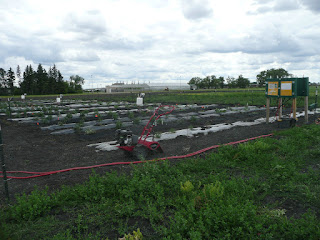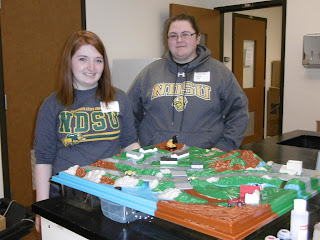 |
| The high tunnel to be used for the project. |
North Dakota State University (NDSU): Agricultural and Biosystems Engineering (ABEN)

| Seeds Sangria Hybrid Watermelon and Hybrid Determinate Tomatoes Celebrity F1) grew in NDSU Agricultural Experiment Station (AES) Research Greenhouse Complex. |
 |
A
subcompact raised bed mulch layer had been used to lay the mulches and drip
tapes underneath simultaneously. |

 |
| Five watermelon or six tomatoes were planted in each 25ft long plot with two parallel drip tapes installed. |
 |
| Cameras were installed to monitor the growth and dataloggers in the white enclosures were to record the soil water potentials and temperatures in the plots. |
 |
| Field visit and discussion. |
 |
| Harvested watermelon and tomatoes to be tested in lab. |
 | ||
| Expanding Your Horizons is a nationwide organization that holds regional conferences for young women in grades 7-9 to encourage and develop their career interests in science, technology, engineering, and math (STEM) in an effort to overcome a history of limited participation by women in these career fields. As shown in above picture, students Anne Gatzke and Hannah Bye demonstrated irrigation and drainage to 9 middle and high school girls in our research lab during the event organized by NDSU on April 9, 2016. |